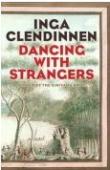 1623702791197553544.jpg
1623702791197553544.jpg
 Dancing with Strangers : The True History of the Meeting of the British First Fleet and the Aboriginal Australians, 1788
single work
Dancing with Strangers : The True History of the Meeting of the British First Fleet and the Aboriginal Australians, 1788
single work
 1623702791197553544.jpg
1623702791197553544.jpg
 Dancing with Strangers : The True History of the Meeting of the British First Fleet and the Aboriginal Australians, 1788
single work
Dancing with Strangers : The True History of the Meeting of the British First Fleet and the Aboriginal Australians, 1788
single work
'In January of 1788, the First Fleet arrived in New South Wales and a thousand British men and women encountered the people who will be their new neighbours - the beach nomads of Australia. "These people mixed with ours," wrote a British observer soon after the landfall, "and all hands danced together." What followed would determine relations between the peoples for the next two hundred years. Drawing skilfully on first-hand accounts and historical records, Inga Clendinnen reconstructs the complex dance of curiosity, attraction, and mistrust performed by the protagonists of either side. She brings this key chapter in British colonial history brilliantly alive. Then we discover why the dancing stopped...' (Source: Book Depository website)
'In 2015, Richie Benaud hosted an ‘Australia Day’ barbeque, a pantheon of colonial historical figures on his invite list. Benaud gathered the English navigator, Captain James Cook, who remapped and renamed the east coast of this continent in 1770, and Burke and Wills, whose agonising deaths at Coopers Creek in 1861 were possibly in part the result of them coming to rely on the seeds of an aquatic fern, nardoo (Marsilea drummondii), for nutrition.' (Introduction)
'The publication of Inga Clendinnen’s Dancing with Strangers in 2003 gave Australia what the country desperately needed for the new millennium: a founding story in which the human beings who encountered each other in 1788 could finally become part of the national imagination.' (Introduction)
'The publication of Inga Clendinnen’s Dancing with Strangers in 2003 gave Australia what the country desperately needed for the new millennium: a founding story in which the human beings who encountered each other in 1788 could finally become part of the national imagination.' (Introduction)
'In 2015, Richie Benaud hosted an ‘Australia Day’ barbeque, a pantheon of colonial historical figures on his invite list. Benaud gathered the English navigator, Captain James Cook, who remapped and renamed the east coast of this continent in 1770, and Burke and Wills, whose agonising deaths at Coopers Creek in 1861 were possibly in part the result of them coming to rely on the seeds of an aquatic fern, nardoo (Marsilea drummondii), for nutrition.' (Introduction)